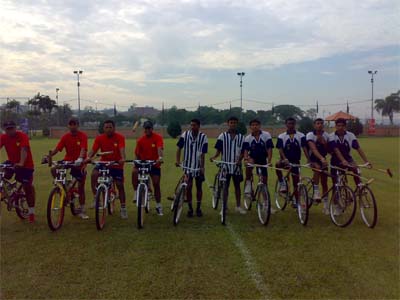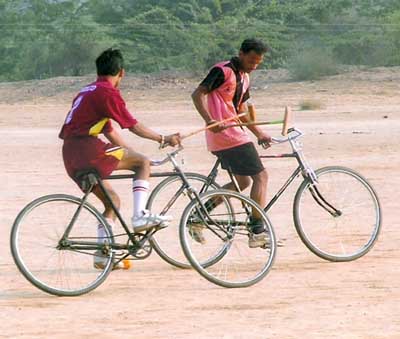The game of bicycle polo was conceived in 1891 and is a direct descendant of the very ancient game of horse polo which dates to 600 BC, It was one of the world’s fastest growing urban sports. In 1891, having retired from racing – ‘ordinary’ and tricycle – the Irish cycling enthusiast Richard J McCready set about inventing a game that would provide ‘strenuous amusement’ and a welcome diversion from editing his beloved Irish Cyclist.

His invention? ‘Polo on Wheels’. Following the inaugural game at the Scalp in Co. Wicklow, Cycling magazine observed the following: “the game of cycle polo promises to be immensely popular…and not at all so dangerous as would appear from the title.”
Quick to show his hand was the mysterious Cosmo- Cyclo who wrote an enthusiastic letter published in Cycling stating that since the introduction of pneumatic tyres “cycle polo is not only possible but exciting and enjoyable too!” The first recorded cycle polo match took place in October of that year at the Scalp in County Wicklow, where Rathclaren Rovers faced off against the Ohne Hast Cycling Club.

Cyril S Scott ‘Scottie’ is the ‘father’ of the modern-day game of bike polo. What RJ started, Scottie took and, well, cycled with. In 1929, following a successful career on road and track, Scottie, a member of the Highbury C.C., was looking for a focus, an outlet for his energy. For a man who had never heard of bike polo, how he came to the game makes for an interesting story… Scottie was a good all-round sportsman – a one-time hockey player he had also played water polo and was familiar with the equine version. In the winter of 1929-30 he often rode with the Corrance C.C. who would take a football on rides for an informal ‘kick-about’. And whilst Scottie joined in, as a cycling man through and through he felt it was somewhat contrary to the ideals of a true cycling clubman. One day, Scottie and his colleague George Bell began trying to move the ball about with ad hoc sticks and branches. As other intrigued cyclists joined in, and temporary goal posts were sited, and teams chosen bike polo was re-born. Cycle polo’s popularity reached its zenith in Great Britain during the 1930s, thanks to the introduction of regional leagues. France also witnessed the growth of the sport during this period, establishing its own league and regularly holding international matches against Great Britain.

| Year | Host City & Country | Gold 🥇 | Silver 🥈 | Bronze 🥉 |
|---|---|---|---|---|
| 1996 | Richland, 🇺🇸 USA | 🇮🇳 India (national team) | 🇺🇸 USA (A.B.P.A. Richland 1) | 🇨🇦 Canada (Jericho C.P.A.) |
| 1999 | Vancouver, 🇨🇦 Canada | 🇮🇳 India (national team) | 🇺🇸 USA (A.B.P.A Richland) | 🇨🇦 Canada (Jericho C.P.A. 1) |
| 2000 | New Delhi, 🇮🇳 India | 🇮🇳 India (national team) | 🇨🇦 Canada (Jericho C.P.A.) | 🇺🇸 USA (A.B.P.A Richland 1) |
| 2001 | London, 🇬🇧 UK | 🇮🇳 India (national team) | 🇨🇦 Canada (Jericho C.P.A.) | 🇫🇷 France (national team) |
| 2002 | Paris, 🇫🇷 France | 🇨🇦 Canada (Jericho C.P.A.) | 🇫🇷 France (national team A) | 🇮🇳 India (national team A) |
| 2003 | Vero Beach, 🇺🇸 USA | 🇨🇦 Canada (Jericho C.P.A.) | 🇺🇸 USA (A.B.P.A Richland) | 🇫🇷 France (national team) |
| 2004 | Vancouver, 🇨🇦 Canada | 🇺🇸 USA (A.B.P.A Richland) | 🇫🇷 France (national team) | 🇮🇳 India (national team) |
| 2005 | Aiken, 🇺🇸 USA | 🇫🇷 France (national team) | 🇺🇸 USA (Aiken "green" B.P.) | 🇨🇦 Canada (Jericho C.P.A.) |
| 2006 | Kennewick, 🇺🇸 USA | 🇨🇦 Canada (Jericho C.P.A.) | 🇺🇸 USA (Unionville B.P.) | 🇫🇷 France (national team) |
| 2015 | Aiken, 🇺🇸 USA | 🇺🇸 USA (Aiken B.P.) | 🇫🇷 France | 🇨🇦 Canada (Jericho C.P.A.) |
| 2016 | Jaipur, 🇮🇳 India | 🇮🇳 India (national team) | 🇬🇧 UK (England) | 🇲🇾 Malaysia |
| 2019 | Buenos Aires, 🇦🇷 Argentina | 🇮🇳 India (national team) | 🇺🇸 USA | 🇬🇧 UK (England) |
© 2025, Cycle Polo Federation of India. All Rights Reserved.